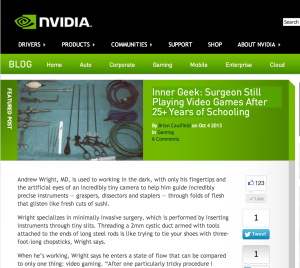One of my colleagues’ son was diagnosed with cancer last week, and was started urgently on chemotherapy. When I found out, I wrote my colleague an email which I have pasted below (with identifying details removed).
I heard about your son through XXXX. I know from recent personal experience how overwhelming this all can be. The disease process is obviously different, but if there is any way that I can give help or advice to you, your son, or your family please let me know. Chemo is rough, but there is light at the end of the tunnel. I had my chemo as an outpatient – 8 hours a day, 40 hours a week, 1 week in 3. I can’t say enough good things about the oncology nurses. They are fantastic, loving people and will take good care of your son.
My best advice for dealing with the chemo is bad television (I watched a lot of junk) – an iPad, headphones, and a netflix subscription would be a big help. I wasn’t able to read or concentrate, and I was too weak to do much else. I did find that massage helped – especially when I developed somatic pain and weird sensory issues from the chemo. Once his blood counts improve and he is cleared to go out in public, you might want to get a prescription for massage. They had to use light pressure, as I bruised too easily for deep tissue. My massage therapist is fantastic – Corinne at Dreamclinic on 65th.
During the bad weeks, my family made me take a walk once a day, even if it was only a slow shuffle to the end of the block and back. During the good weeks I still wasn’t up to strenuous exercise, but my family did make sure that I got out of the house on occasion. In the good weeks I also tried to do very gentle yoga, just to keep my body stretched out. I would only go to a “slow hatha” or “recovery” class, and just explain to the instructor that I would only do what I could.
I had a lot of nausea, even on 4-5 different anti-emetics. I did end up using medical marijuana during the worst of it. It sounds odd, as I don’t use drugs and had only used marijuana once or twice in college, but I found that there were times that it was the only thing that helped, even on zofran, steroids, compazine, benedryl, and ativan. I didn’t want to smoke, so I used edible brownies or rice krispy treats. I only used it 3-4 times, but when I needed it, it really helped.
Depending on the chemo regimen that he is on, there may ways to prevent long-term side effects. I developed peripheral neuropathy secondary to cisplatin. In retrospect, it turns out that Vitamin E has been shown to minimize the risk of this, but I didn’t do this research and no one brought it up until I developed the symptoms and by then it was too late. Obviously, the first priority is getting the lymphoma under control. After that you may want to research the most common long-term side effects of his regimen, and research or ask about ways to mitigate the risks.
I personally found it therapeutic to blog about my treatment. It may not be for everyone, but it allowed me a chance to reflect on what I was going through and what I was thinking about. I think I used it in lieu of therapy. Blogging may not be for everyone, but he may want to keep a journal. If he does want to blog, I used wordpress.com.
Once he is getting towards the end of the chemo, realize that there will be a long recovery process before he is back to full strength. Every day gets better, but it truly was about 6 months before I was up to almost full energy and strength and there are physical and psychological impacts that still last a year and a half later. For about 3 of those months I worked with a personal trainer to get my endurance back (my lowest crit was 26, which I could really feel).
The good news is that he is in the best possible place – the physicians and nurses at the UW and the SCCA are fantastic, and he is with a supportive and loving family. Again, let me know if there is anything that Stacy and I can do.
Andy


